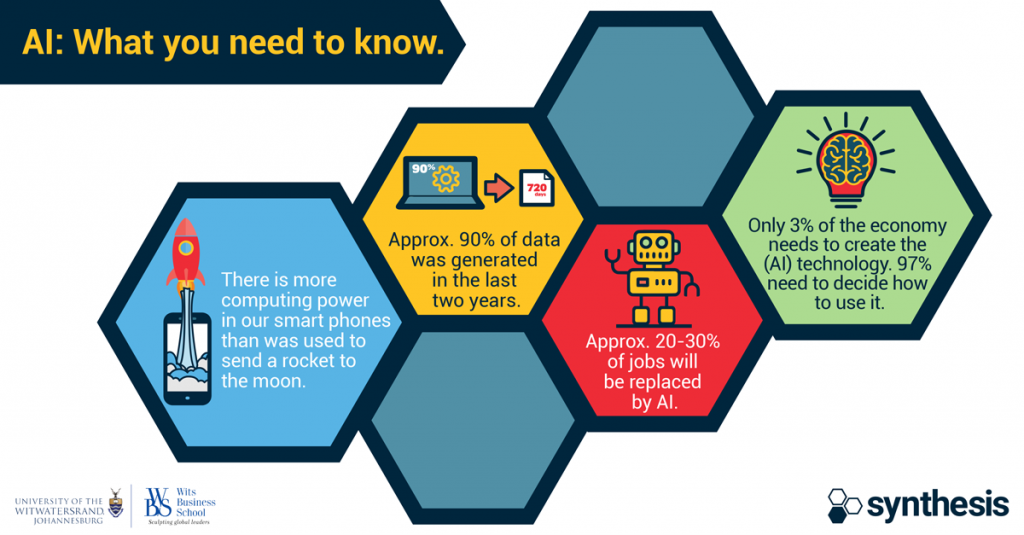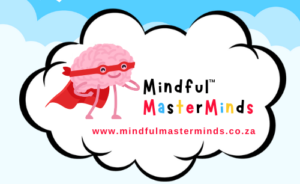Is South Africa ready for AI? What about the role of humans in AI? Is AI really going to take over our jobs? Where do companies start, when it comes to AI readiness?
These were just a few of the questions that Wits Business School’s Professor Brian Armstrong put to three experts at a recent webinar hosted by WBS and Synthesis Software Technologies.
“There is so much hype surrounding AI, but how are organisations managing their readiness? Is there a right way and a wrong way to do AI? It’s useful to speak to people who have practical experience of AI in the workplace who have personal experience about what is possible, what is not possible and what may be possible in the future,” said Armstrong, Director of the BCX Chair in Digital Business at WBS, in his introduction.
The guest speakers, who are all at the “coalface” of AI in South Africa, were: Catherine Lückhoff, Founder and CEO of 20Fifty which specialises in modern application development, serverless cloud computing and AI; Archana Arakkal, Machine Learning Engineer at Synthesis (Intelligent Data Division) and Houston Muzamhindo, an analytics and data science specialist at Investec.
With an online audience of nearly 500, a flurry of questions emerged during the discussion, further proof that, while AI is here to stay, there is a lot of uncertainty around its practical application, for human beings and in the work environment, and to what extent South Africa is ready.
A recurring theme throughout the discussion was: what about the human element in AI?
“Is AI a tool to help us do things better? Or is it a force that will take over our jobs? Those are the two common narratives surrounding AI,” noted Armstrong.
All three panellists agreed it is critical to understand the impact of AI on people, and the role that algorithms play in our daily lives and decision-making. There needs to be a clearer understanding of the role the AI can play in an organisation, and where human skill comes into the process.
“That there are benefits to AI is beyond question, but how do we elevate the role of human beings in decision-making? We need to guard against over-valuing AI, it is not human,” said Lückhoff. “We need to ensure that there is space for human beings when it comes to advisory and decision-making roles in organisations.”
Arakkal agreed, noting that in any given AI use case, machine learning is only 10% of the problem, while the ‘people part’ – the ethics and privacy issues, and the overall organisational element, is 90% of the problem.
“There is more hype than ever before about AI because we are getting closer and closer to being ready. Cloud computing means amazing rates of processing speed and our ability to store data is better than ever. But companies have to ask, is our environment ready for AI? And in fact, often they realise that they don’t actually need it.”
Muzamhindo agreed that new technologies, more data and better algorithms have led to the increase in all the recent AI hype. “We have more computing power in our smart phones than was used to send a rocket to the moon. Technology’s time has come – and I believe that in every industry there is use case for AI.”
Other key points that emerged from the rapid-fire conversation included the fact that AI is not just for the “techies”. You don’t need to be able to code, noted Muzamhindo, you just need to know how to apply and leverage AI for the benefit of your business and your people.
As Armstrong put it: “Only 3% of the economy needs to do the actual technology, 97% of the economy needs to learn to use it wisely.”
“It is not just about the technology, you cannot ignore ethical and privacy considerations. AI needs both soft and hard skills – they are all part of this journey,” said Arakkal.
When considering the AI inhibitors in South Africa, the panellists agreed that fear is one of the main factors. This is because of the perceived negative connotations of AI, including the impact on jobs. It is said that 20 – 30% of jobs will be displaced by AI.
“The challenge, for firms, is to focus AI on the mundane, repetitive jobs that no human being should be doing, but to then upskill and compensate the workforce accordingly,” said Lückhoff.
“We need to adopt the mind-set that AI is here to actually assist us, not take over,” noted Arakkal. “It is the responsibility for firms to decide how AI is going to help people who are stuck in mindless jobs, and then upskill them.”
“We have to ask ourselves when we employ AI, which are the people who will be negatively impacted. And where can we best employ AI – such as in a support centre which has hundreds of thousands of calls a month, AI is best positioned to manage quality control,” said Muzamhindo.
“Clearly, we don’t have the luxury of ignoring AI, it is here to stay and is part of a firm’s global competitiveness,” Armstrong pointed out. “However, we also cannot ignore that people need to be ready, to be upskilled and, if necessary, re-directed within the organisation. HR, for example, needs to be in on AI implementation projects from the beginning.”
“One of the things getting in the way of positive progress in AI in this country is fear,” noted Lückhoff. “We don’t need to be afraid of AI, we just need to understand it. The ‘ups’ outweigh the ‘downs’ when it comes to AI – we need to focus on the incredible benefits.”
“One of the biggest causes of fear is ignorance,” agreed Armstrong. “It is incumbent upon all of us to find out more and become more informed.
“But a few things are clear: AI is here to stay, AI is for everybody, and AI can be a force for good if ethically applied.”
Alison Gaylard, Writer at Wits Business School







